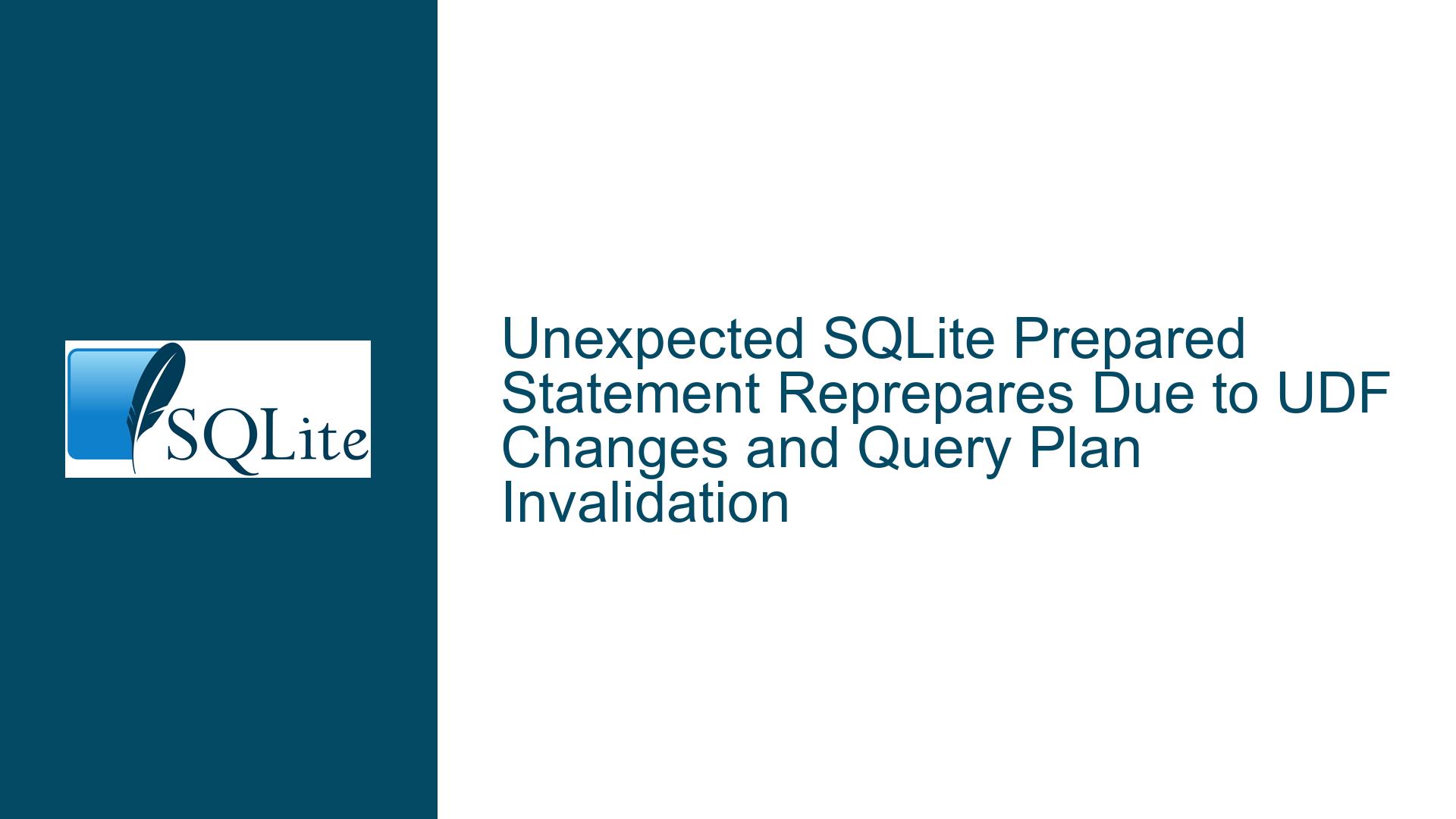Unexpected SQLite Prepared Statement Reprepares Due to UDF Changes and Query Plan Invalidation
Issue Overview: High Reprepare Rates in Multi-Threaded Application with SQLite Connections
The core issue involves an application experiencing frequent reprepares of SQLite prepared statements despite no intentional schema modifications. The application uses multiple threads, each maintaining dedicated SQLite connections and prepared statements. Critical performance degradation occurs when sqlite3_step() triggers recompilation of statements like SELECT DISTINCT id FROM fd... and even simple commands like COMMIT, with reprepare counts nearly matching execution counts (e.g., 310 executions vs. 309 reprepares). Key characteristics include:
- Thread-Specific Behavior: Reprepare rates vary across threads. One thread may execute
COMMIT350 times with zero reprepares, while another thread sees 342 executions with 312 reprepares. - Non-Schema Triggers: The application does not explicitly alter database schemas during runtime, ruling out traditional
SQLITE_SCHEMAerrors caused byCREATE,ALTER, orDROPoperations. - Extension Usage: The
CARRAYextension (viasqlite3_carray__) is employed in parameterized queries, introducing potential variability in query plan generation. - Unexpected Recompilation Triggers: Re-prepares occur silently within
sqlite3_step(), handled internally without surfacing errors to the application layer.
This behavior indicates that SQLite’s internal mechanisms for invalidating prepared statements are being activated by factors other than direct schema changes. The primary challenge lies in identifying which non-schema events or configuration changes force statement recompilation and how they interact with the application’s use of SQLite features like user-defined functions (UDFs) and query optimizations.
Possible Causes: UDF Lifecycle Management and Query Plan Stability
1. User-Defined Function (UDF) Registration/Deregistration
SQLite invalidates all prepared statements associated with a database connection when UDFs or collating sequences are added, modified, or removed. This is because prepared statements may implicitly depend on these functions, even if they are not directly referenced. For example:
- A UDF named
custom_sort()registered after preparing a statement could alter the execution environment, necessitating recompilation. - Deregistering a UDF used in a
WHEREclause (e.g.,WHERE custom_filter(id)) forces recompilation to remove the function reference.
In the discussed scenario, the application dynamically creates UDFs via sqlite3_create_function16() on-demand. Each registration or deregistration triggers a call to sqlite3ExpirePreparedStatements(), marking all statements in the connection as expired. Subsequent executions of sqlite3_step() on expired statements silently recompile them, leading to high reprepare counts.
2. Query Plan Invalidation Due to Statistical Changes
When SQLITE_ENABLE_STAT3 or STAT4 is enabled, SQLite collects histogram data about column value distributions to optimize query plans. Changes to these statistics—either through explicit ANALYZE commands or automatic updates during data modifications—can invalidate existing query plans. For instance:
- A prepared statement using an index on column
e_oidmay switch to a full scan if STAT3 data indicates the index is no longer selective. - Binding a parameter that drastically changes value distribution (e.g., switching from
?1 = 0to?1 = 1where1matches 99% of rows) may trigger recompilation to adopt a different plan.
The application’s use of SQLITE_ENABLE_STAT3 (but not STAT4) introduces a risk of plan instability, especially with parameterized queries containing IN clauses or range conditions. The CARRAY extension, which binds arrays of values, may exacerbate this by creating variable-length IN lists that the optimizer evaluates differently across executions.
3. Connection-Specific Configuration Changes
Each SQLite connection maintains isolated configuration states, including:
- Authorization callbacks: Changes via
sqlite3_set_authorizer(). - Collation sequences: Modifications via
sqlite3_create_collation(). - Runtime limits: Adjustments using
sqlite3_limit().
Altering these settings on a connection invalidates all its prepared statements. For example, a thread that adjusts the SQLITE_LIMIT_VARIABLE_NUMBER during runtime would force reprepares for statements using variable counts near the new limit.
Troubleshooting Steps, Solutions & Fixes: Diagnosing and Eliminating Reprepare Triggers
1. Instrument SQLite to Log Recompilation Events
Enable SQLite’s error logging mechanism to capture recompilation triggers. Override the sqlite3_log() callback to record events associated with statement expiration:
void sqlite_log_callback(void* pArg, int code, const char* msg) {
if (code == SQLITE_NOTICE && strstr(msg, "statement expired")) {
log_application_event("STATEMENT REPREPARE: %s", msg);
}
}
sqlite3_config(SQLITE_CONFIG_LOG, sqlite_log_callback, NULL);
Augment logging with stack traces or thread IDs to identify which code paths trigger expiration. For instance, trace calls to sqlite3ExpirePreparedStatements() in the SQLite amalgamation to pinpoint UDF registrations, collation changes, or authorization modifications.
2. Audit UDF and Collation Lifecycle Management
Review all UDF registrations and collation sequence definitions for patterns that cause repeated creation/removal:
- Static Registration: Initialize all UDFs and collations once per connection during startup. For example:
void init_udfs(sqlite3* db) {
sqlite3_create_function16(db, L"MY_UDF", 1, SQLITE_UTF16, NULL, &my_udf, NULL, NULL);
}
- Lazy Initialization with Caching: If UDFs are needed dynamically, cache their existence to avoid redundant registrations:
std::unordered_set<std::wstring> registered_udfs;
void ensure_udf(sqlite3* db, const wchar_t* name) {
if (!registered_udfs.count(name)) {
sqlite3_create_function16(db, name, 1, SQLITE_UTF16, NULL, &my_udf, NULL, NULL);
registered_udfs.insert(name);
}
}
- Avoid Deregistration: Never call
sqlite3_create_function16()with a NULL function pointer to delete UDFs unless absolutely necessary. Design the application to retain UDFs for the connection’s lifetime.
3. Stabilize Query Plans with Fixed Bind Patterns and STAT4
Recompile query plans unpredictably when binding parameters vary widely in selectivity. Mitigate this by:
Using STAT4 Instead of STAT3: STAT4’s enhanced histogram data reduces plan volatility. Recompile SQLite with
-DSQLITE_ENABLE_STAT4and regenerate statistics viaANALYZE.Binding Consistency: Ensure parameters passed to
CARRAYorINclauses have consistent cardinality. For example, padCARRAYinputs to a fixed length with dummy values when necessary to avoid plan switches between small and large arrays.Query Hints: Embed
INDEXED BYclauses orNOT INDEXEDdirectives to lock in specific access paths, overriding the optimizer’s choice. This is a last resort, as it bypasses SQLite’s adaptive optimizations.
4. Isolate Configuration Changes to Dedicated Connections
Confine runtime configuration adjustments (e.g., sqlite3_limit(), sqlite3_set_authorizer()) to connections that do not execute performance-critical prepared statements. For example:
Dedicated “Config” Connection: Use a separate connection for administrative tasks like adjusting limits or registering UDFs, ensuring these changes do not pollute the main query connections.
Connection Pool Segmentation: Partition connection pools into “stable” pools (no configuration changes) and “dynamic” pools (allowed to adjust settings), routing queries accordingly.
5. Precompile High-Use Statements with sqlite3_prepare_v2() Caching
Minimize the performance impact of unavoidable reprepares by caching prepared statements in a thread-safe manner:
std::mutex stmt_cache_mutex;
std::map<std::string, sqlite3_stmt*> stmt_cache;
sqlite3_stmt* get_cached_stmt(sqlite3* db, const std::string& sql) {
std::lock_guard<std::mutex> lock(stmt_cache_mutex);
auto it = stmt_cache.find(sql);
if (it != stmt_cache.end()) {
return sqlite3_clone(db, it->second); // Use SQLite's statement cloning API if available
} else {
sqlite3_stmt* stmt;
sqlite3_prepare_v2(db, sql.c_str(), -1, &stmt, NULL);
stmt_cache[sql] = stmt;
return sqlite3_clone(db, stmt);
}
}
Note: sqlite3_clone() is available in SQLite 3.11.0+. For older versions, maintain a per-connection cache.
6. Profile and Optimize Recompilation Overhead
If reprepares are unavoidable, measure their CPU and latency impact using sqlite3_stmt_status():
int64_t get_reprepare_cost(sqlite3_stmt* stmt) {
int64_t vm_steps = sqlite3_stmt_status(stmt, SQLITE_STMTSTATUS_VM_STEP, 0);
int64_t reprepares = sqlite3_stmt_status(stmt, SQLITE_STMTSTATUS_REPREPARE, 0);
int64_t run_time_ns = sqlite3_stmt_status(stmt, SQLITE_STMTSTATUS_RUN_TIME_NS, 0);
return (reprepares > 0) ? (run_time_ns / reprepares) : 0;
}
Use this data to prioritize optimization efforts on statements with the highest reprepare frequency and cost. Consider moving such statements to stored procedures (via temporary tables or CTEs) to reduce parse/plan overhead.
7. Review and Refactor CARRAY Usage
The CARRAY extension binds arrays as parameters, which can lead to variable-length IN clauses. Each length change may trigger a new query plan. Address this by:
- Fixed-Length CARRAY Binding: Pad arrays to a fixed maximum length, using placeholder values (e.g.,
-1) ignored by the query:
SELECT id FROM fd WHERE id IN CARRAY(?1, 100) AND id != -1
- Materialize Arrays in Temporary Tables: Insert array elements into a temporary table once per connection and join against it:
WITH input_ids(id) AS (SELECT value FROM carray(?1, ?2))
SELECT f.id FROM fd f JOIN input_ids i ON f.id = i.id
This decouples the array length from the query text, allowing plan reuse.
8. Upgrade SQLite and Leverage New Features
Newer SQLite versions optimize statement recompilation logic. For example, version 3.44.0+ improves UDF dependency tracking to avoid unnecessary reprepares. Additionally, the SQLITE_DBCONFIG_NO_CKPT_ON_CLOSE flag reduces WAL checkpointing overhead in multi-threaded environments, indirectly improving reprepare latency.
Final Note: Address reprepare triggers holistically by combining UDF lifecycle management, query plan stabilization, and connection configuration isolation. Prioritize fixes based on profiling data to maximize performance gains.






